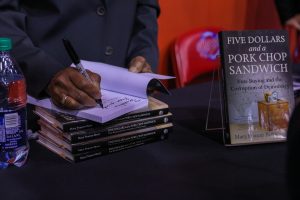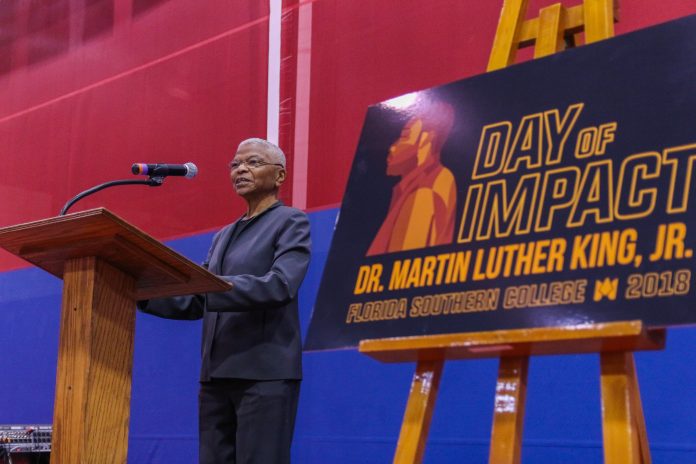
Peter Edgar
Dr. Mary Frances Berry, acclaimed civil and human rights activist and professor at UPenn, spoke to the FSC community on Martin Luther King Jr. Day, commemorating King’s legacy and vision and applying it to the College.
After being introduced by the Multicultural Student Council President Assia Angelini, Berry spoke to issues of race, class, and gender in her discourse in front of more than 200 students, faculty, and administrative gures, acknowledging the intersections between demographics that make civil rights a multifaceted issue.
Berry began by referencing the trials that the civil rights movements have already faced: she highlighted the Reagan Era, when the bill was passed (over the President’s vetoes) to establish Martin Luther King Jr. Day and to enact sanctions against apartheid South Africa. She also noted the Clinton years, when their president—who, according to Berry, “still does” run after women—passed laws in a reaction to Republican claims that Democrats weren’t tough enough on crime that resulted in disproportionately incarcerating African- Americans.
This MLK Jr. Day marks not only the legacy of one of the most well-known members of the civil rights movement, but also the 50th anniversaries of his assassination and the release of the Kerner Report, which ventured to explain the reasons behind large civil unrest in the nation. While the report was important, Berry said, it was important because it painted the United States as gravitating towards having “two societies”—a “White society” and a “Black society.”
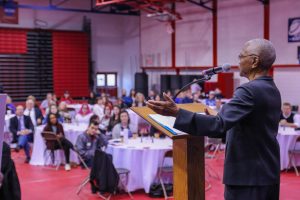
Berry then pivoted to the recent election and the Black Lives Matter movement (founded by Patrisse Khan-Cullors, Alicia Garza, and Opal Tometi), the former of which catalyzed a new kind of resistance in the latter. BLM, she says, does better at including individuals of multiple cultural backgrounds and identities, and is “more diversified.”
“Everybody discriminated against has a discrimination problem,” said Berry. “But not every group must have the same solution.”
Berry then spoke directly to the administration and the student culture of Florida Southern College. She noted that the College’s mission statement “claims diverse relationships” but that, according to our demographic distribution, that it is “not a reality.”
“Many institutions have a similar problem,” she said. “Structural problems, and symbolic issues.”
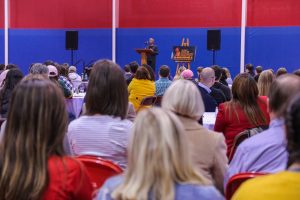
Berry wanted students to know that racism wasn’t fixed at Florida Southern just because Student Government Association President Caitlyn Johnson was elected. She emphasized that there “has been a lot of change,” but that it still is an issue in the hearts and minds of those who are resistant or willfully oblivious to the idea of their privilege, and that “when there’s a will, there’s a way.”
“But what would Martin do?” Berry asked, noting that she had declined an invitation earlier in the morning to answer that question on television.
She listed activities and mindsets that she believes King embodied while he was still alive. “He was courageous, strategic… He knew he was not a magic man.”
She emphasized that he was not born a leader, but that he could leverage his skills with words to be one, always attempting to be “aligning reality with the great documents of our life.” King had fears about “whether he would measure up.”
As she closed, Berry quoted pieces of King’s speeches, from “the long arm of the law bends towards justice” to our calling to “comfort the af icted and to af ict the comfortable” to “No lie can live forever,” which King actually attributed to the Reverend Theodore Parker.
Most importantly, however, Martin Luther King Jr. would engage in face-to-face discussion, Berry said. “He would talk to people.”
She noted, “People need leaders who won’t be stupid,” and that while “hope remains elusive for large numbers of people in our country,” “don’t let efforts against change stop [you].”
“hope remains elusive for large numbers of people in our country”
Answering a student question about the right and safe way to protest, Berry re- minded the audience that while protest has never been safe (she and her friends had been physically “dragged up the streets” for civil disobedience), it is a risk worth taking and a sacrice worth making.
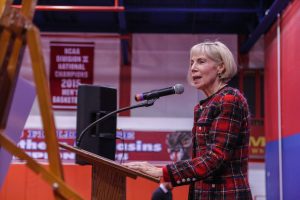
Following the speech and a traditional song performed by Tatiana Montilla, Florida Southern College President Dr. Anne Kerr made closing remarks. Kerr spoke with Berry for several minutes as well, discussing the ways that the College responds to issues of diversity.
Following the dismissal many students and professors bought copies of Berry’s books and had them signed.
